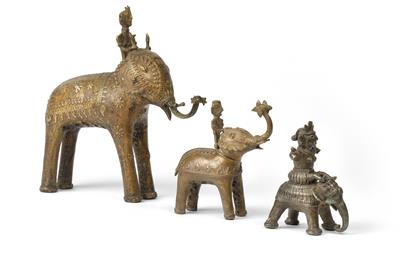Mixed lot (3 items): India: Three ‘Bastar bronzes’ in the form of three elephants with riders (probably local deities).
Mixed lot (3 items): India: Three ‘Bastar bronzes’ in the form of three elephants with riders (probably local deities).

The elephants are decorated with rich, ceremonial ornaments, in the same way in which they are adorned during real ritual processions. The arms of the smallest elephant’s rider are broken.
H: c. 60 cm, 11 cm and 10 cm. (ME)
Provenance: German Private Collection.
In isolated rural regions of India, especially where the non-Hindu tribes (‘Adivasi’) live, wandering founders travel from village to village and manufacture such charming sculptures, upon request, for these tribes. This is the case, for instance, in the villages of the Indian federal states of Orissa, Bihar, Maharashtra, Bengal and others. The small works of art are named after one of these tribes and are an important branch of Indian arts and crafts. The individual pieces are first of all moulded from beeswax and then produced with yellow cast-alloy (brass) in ‘waste mould’ (also known as ‘cire perdue’ casting). Hence, each ‘Bastar bronze’ is an original piece.
additional picture:
‘Bastar bronzes’: An Indian wandering founder at work in one of the tribal villages in Orissa.
Photo from ‘Cire Perdue Casting in India’ by Ruth Reeves
Specialist: Erwin Melchardt
 Erwin Melchardt
Erwin Melchardt
+43-1-515 60-465
erwin.melchardt@dorotheum.at
26.05.2015 - 15:00
- Realized price: **
-
EUR 500.-
- Estimate:
-
EUR 800.- to EUR 1,000.-
Mixed lot (3 items): India: Three ‘Bastar bronzes’ in the form of three elephants with riders (probably local deities).
The elephants are decorated with rich, ceremonial ornaments, in the same way in which they are adorned during real ritual processions. The arms of the smallest elephant’s rider are broken.
H: c. 60 cm, 11 cm and 10 cm. (ME)
Provenance: German Private Collection.
In isolated rural regions of India, especially where the non-Hindu tribes (‘Adivasi’) live, wandering founders travel from village to village and manufacture such charming sculptures, upon request, for these tribes. This is the case, for instance, in the villages of the Indian federal states of Orissa, Bihar, Maharashtra, Bengal and others. The small works of art are named after one of these tribes and are an important branch of Indian arts and crafts. The individual pieces are first of all moulded from beeswax and then produced with yellow cast-alloy (brass) in ‘waste mould’ (also known as ‘cire perdue’ casting). Hence, each ‘Bastar bronze’ is an original piece.
additional picture:
‘Bastar bronzes’: An Indian wandering founder at work in one of the tribal villages in Orissa.
Photo from ‘Cire Perdue Casting in India’ by Ruth Reeves
Specialist: Erwin Melchardt
 Erwin Melchardt
Erwin Melchardt
+43-1-515 60-465
erwin.melchardt@dorotheum.at
|
Buyers hotline
Mon.-Fri.: 10.00am - 5.00pm
kundendienst@dorotheum.at +43 1 515 60 200 |
| Auction: | Tribal Art |
| Auction type: | Saleroom auction |
| Date: | 26.05.2015 - 15:00 |
| Location: | Vienna | Palais Dorotheum |
| Exhibition: | 20.05. - 26.05.2015 |
** Purchase price incl. buyer's premium and VAT
It is not possible to turn in online buying orders anymore. The auction is in preparation or has been executed already.
